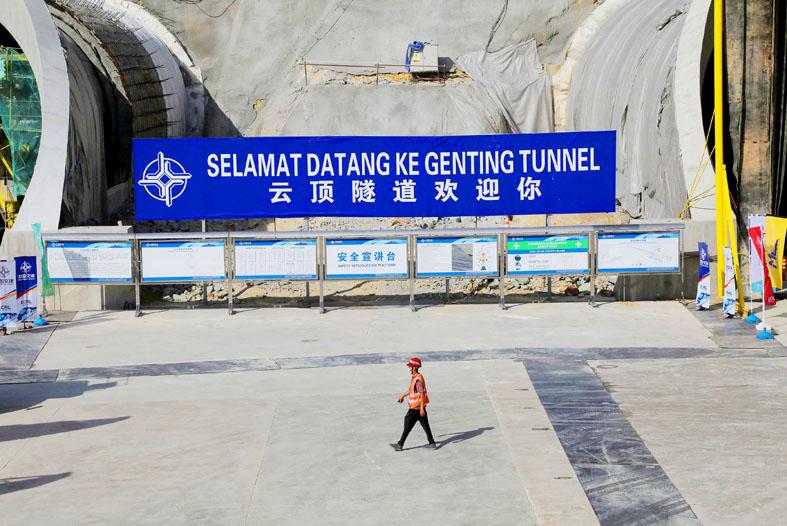China’s finance and investment spending in Belt and Road Initiative countries fell slightly in the first half compared with a year earlier, with no new coal projects and investments in Russia, Egypt and Sri Lanka falling to zero, new research published on Sunday showed.
Saudi Arabia was the biggest recipient of Chinese investments over the period, with about US$5.5 billion, the Shanghai-based Green Finance and Development Center (GFDC) research showed.
Total financing and investment stood at US$28.4 billion over the period, down from US$29.6 billion a year earlier, bringing total cumulative Belt and Road spending to US$932 billion since 2013, GFDC said.

Photo: Reuters
Chinese President Xi Jinping (習近平) launched the Belt and Road Initiative in 2013 aiming to harness China’s strengths in financing and infrastructure construction to “build a broad community of shared interests” throughout Asia, Africa and Latin America.
It has come under scrutiny for the debt burden it places on countries and other issues such as environmental degradation. Some countries have also renegotiated their investment projects with China, highlighting the debt risks.
No new coal projects received Chinese support over the period after a pledge made at the UN General Assembly by Xi in September last year to put an end to overseas coal financing.
However, a Chinese developer won a bid to build a thermal power plant in Indonesia in February, and there are still 11.2 gigawatts of capacity that have already secured financing, but are yet to begin construction, said GFDC, part of Shanghai’s Fudan University.
China has continued to provide support to other fossil fuel projects in Belt and Road countries, with oil and gas amounting to about 80 percent of China’s overseas energy investments and 66 percent of its construction contracts, GFDC said.
Engagements in gas projects stood at US$6.7 billion in the first half, compared with US$9.5 billion over the whole of last year, it said.
Green energy and hydropower transactions fell 22 percent from a year earlier. Investment rose to US$1.4 billion from US$400 million, but green energy-related construction spending fell to US$1.6 billion, less than half the level a year earlier.

Taiwan’s long-term economic competitiveness will hinge not only on national champions like Taiwan Semiconductor Manufacturing Co. (TSMC, 台積電) but also on the widespread adoption of artificial intelligence (AI) and other emerging technologies, a US-based scholar has said. At a lecture in Taipei on Tuesday, Jeffrey Ding, assistant professor of political science at the George Washington University and author of "Technology and the Rise of Great Powers," argued that historical experience shows that general-purpose technologies (GPTs) — such as electricity, computers and now AI — shape long-term economic advantages through their diffusion across the broader economy. "What really matters is not who pioneers

In a high-security Shenzhen laboratory, Chinese scientists have built what Washington has spent years trying to prevent: a prototype of a machine capable of producing the cutting-edge semiconductor chips that power artificial intelligence (AI), smartphones and weapons central to Western military dominance, Reuters has learned. Completed early this year and undergoing testing, the prototype fills nearly an entire factory floor. It was built by a team of former engineers from Dutch semiconductor giant ASML who reverse-engineered the company’s extreme ultraviolet lithography (EUV) machines, according to two people with knowledge of the project. EUV machines sit at the heart of a technological Cold

TAIWAN VALUE CHAIN: Foxtron is to fully own Luxgen following the transaction and it plans to launch a new electric model, the Foxtron Bria, in Taiwan next year Yulon Motor Co (裕隆汽車) yesterday said that its board of directors approved the disposal of its electric vehicle (EV) unit, Luxgen Motor Co (納智捷汽車), to Foxtron Vehicle Technologies Co (鴻華先進) for NT$787.6 million (US$24.98 million). Foxtron, a half-half joint venture between Yulon affiliate Hua-Chuang Automobile Information Technical Center Co (華創車電) and Hon Hai Precision Industry Co (鴻海精密), expects to wrap up the deal in the first quarter of next year. Foxtron would fully own Luxgen following the transaction, including five car distributing companies, outlets and all employees. The deal is subject to the approval of the Fair Trade Commission, Foxtron said. “Foxtron will be

INFLATION CONSIDERATION: The BOJ governor said that it would ‘keep making appropriate decisions’ and would adjust depending on the economy and prices The Bank of Japan (BOJ) yesterday raised its benchmark interest rate to the highest in 30 years and said more increases are in the pipeline if conditions allow, in a sign of growing conviction that it can attain the stable inflation target it has pursued for more than a decade. Bank of Japan Governor Kazuo Ueda’s policy board increased the rate by 0.2 percentage points to 0.75 percent, in a unanimous decision, the bank said in a statement. The central bank cited the rising likelihood of its economic outlook being realized. The rate change was expected by all 50 economists surveyed by Bloomberg. The